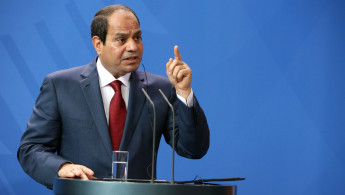Egypt's Sisi says most painful economic reforms over
Egypt's president said on Wednesday that the most painful part of his economic reform programme was over, but cautioned there was still some way to go before it was completed.
In televised comments aired live, Abdel Fattah al-Sisi said Egypt has gone through the worst of the fallout from the reforms.
"Not too much is left and it won't be harsher than what we had already gone through. We are determined to finish it," Sisi said.
The reforms have included floating the currency, substantial cuts in state subsidies on basic goods, and introducing a wide range of new taxes.
The measures led to a significant rise in prices and services that have hurt the poor and middle class the hardest.
The reforms were agreed on with the International Monetary Fund in exchange for a $12 billion loan.
Sisi thanked Egyptians for "enduring the harsh and difficult (economic) measures," something that he has often done since the reforms began in 2016 with the floatation of the currency that cost the Egyptian pound more than half of its value.
His thanks and implicit warning that more reforms were to come appeared designed to prepare Egyptians for a widely anticipated wave of price rises this year that could include fuel and electricity.
He said his government had no choice but to embark on the reform programme.
"Anything else would have led to the collapse of the state," he said in an address marking Police Day, a national holiday that falls on January 25.
Years of political turmoil and violence following a 2011 uprising that toppled the 29-year regime of autocrat Hosni Mubarak has crippled the economy, keeping foreign tourists and investors out and reducing productivity.
Sisi's reforms have fuelled popular discontent but that never boiled over onto the streets.
Police have brutally dealt with the rare street protests that took place under Sisi, in office since 2014.
Demonstrations also are virtually banned under a 2013 law, with offenders facing up to five years in prison if convicted.





 Follow the Middle East's top stories in English at The New Arab on Google News
Follow the Middle East's top stories in English at The New Arab on Google News
![Israeli forces ordered bombed Gaza's Jabalia, ordering residents to leave [Getty]](/sites/default/files/styles/image_330x185/public/2176418030.jpeg?h=a5f2f23a&itok=_YGZaP1z)

